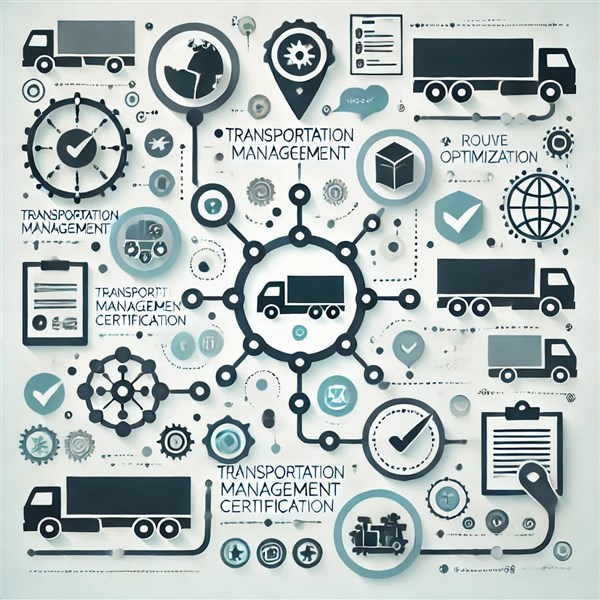
The global logistics and supply chain industries are critical to the smooth functioning of the economy, and transportation management plays a central role in ensuring products and materials move efficiently from one point to another. As these industries continue to grow and evolve, companies are increasingly seeking professionals who possess specialized skills in transportation management to drive efficiency, reduce costs, and enhance operational performance.
Earning a Transportation Management Certification is one of the best ways to gain these specialized skills and position yourself as a valuable asset in the industry. This certification validates your expertise in areas such as logistics planning, freight management, and supply chain optimization, making you stand out to employers. In this blog, we’ll explore the top skills gained from a Transportation Management Certification and how they can help advance your career.
Skills Gained from a Transportation Management Certification
1. Logistics Planning and Coordination
Effective logistics planning and coordination are at the heart of transportation management. Through certification, you’ll gain the ability to plan, execute, and monitor the movement of goods in a way that ensures efficiency and cost-effectiveness.
Key Skills Developed:
- Route Optimization: You’ll learn how to design and optimize transportation routes to minimize travel time and fuel consumption, reducing costs and improving delivery times.
- Scheduling and Timing: Gaining expertise in scheduling helps ensure that shipments arrive on time, preventing delays and bottlenecks in the supply chain.
- Multi-Modal Transportation: You’ll understand how to coordinate the use of multiple transportation modes (road, rail, air, and sea) to achieve the best results for different types of shipments.
These skills are critical for managing transportation in a complex supply chain, especially as global trade grows and companies need to manage logistics across multiple borders and regulations.
2. Freight Management
Freight management is a vital component of transportation management. A Transportation Management Certification equips you with the knowledge and tools to handle both inbound and outbound shipments efficiently. This includes understanding the complexities of shipping regulations, documentation, and freight classification.
Key Skills Developed:
- Carrier Selection: Certification programs teach you how to select the most appropriate freight carriers based on factors like cost, reliability, and speed.
- Rate Negotiation: Learning how to negotiate competitive rates with freight carriers is essential for maintaining profitability while ensuring timely deliveries.
- Shipment Tracking and Visibility: Modern freight management requires the ability to track shipments in real-time, providing customers and internal stakeholders with up-to-date information on delivery status.
With these skills, certified professionals are better equipped to manage the end-to-end movement of goods and ensure that shipments are handled with the greatest efficiency.
3. Risk Management and Compliance
Transportation managers must navigate a wide range of risks, including disruptions caused by weather, labor strikes, geopolitical issues, and regulatory changes. Certification programs provide you with the tools to manage these risks effectively while ensuring compliance with local, national, and international laws.
Key Skills Developed:
- Risk Identification and Mitigation: You’ll learn how to identify potential risks in the supply chain and develop contingency plans to minimize their impact. This includes managing unexpected events like shipment delays or border issues.
- Regulatory Compliance: Transportation management requires an understanding of the legal frameworks governing logistics. Certification programs help you stay current with transportation regulations, including customs laws, safety standards, and environmental guidelines.
- Insurance and Liability Management: Ensuring that your shipments are properly insured and that all liability issues are addressed is a critical skill for transportation managers, protecting the company from unexpected financial losses.
Professionals who can manage these risks and navigate compliance challenges are highly valued in the industry, as they help minimize disruptions and reduce operational costs.
4. Supply Chain Optimization
Supply chain optimization is about finding ways to make the entire supply chain — from sourcing raw materials to delivering finished products — more efficient. Certified transportation managers are skilled at identifying inefficiencies and implementing improvements.
Key Skills Developed:
- Data-Driven Decision Making: You’ll learn how to use data analytics to monitor and improve transportation performance, identifying trends and areas for optimization. These insights can drive better decision-making around routing, carrier selection, and fleet management.
- Process Improvement: Gaining the ability to continuously evaluate and improve transportation processes, often using methodologies like Lean or Six Sigma, allows you to enhance operational efficiency and reduce waste.
- Cost Control: Transportation costs can be a significant portion of a company’s overall expenses. With certification, you’ll develop the ability to track and control costs, ensuring that transportation expenses are aligned with budgetary goals.
Effective supply chain optimization not only improves efficiency but also enhances the overall customer experience by ensuring timely and cost-effective delivery of goods.
5. Customer Service and Relationship Management
Transportation managers often serve as the main point of contact between companies, suppliers, and customers. Strong customer service and relationship management skills are essential for maintaining positive working relationships and ensuring smooth communication throughout the supply chain.
Key Skills Developed:
- Customer Communication: You’ll learn how to effectively communicate with customers regarding shipment statuses, delays, and any issues that arise. Managing customer expectations is a critical part of ensuring satisfaction.
- Supplier Relationship Management: Developing strong relationships with suppliers and logistics partners is essential for negotiating favorable terms, resolving disputes, and ensuring reliable service.
- Problem-Solving: When issues like shipment delays or damaged goods arise, certified transportation managers are equipped with the problem-solving skills to address these challenges quickly and efficiently.
Strong customer service skills are vital for transportation managers who must balance the needs of customers with the operational realities of managing logistics.
6. Technological Proficiency
Modern transportation management is driven by technology. From transportation management systems (TMS) to advanced analytics tools, understanding and leveraging technology is critical for improving operational efficiency.
Key Skills Developed:
- Transportation Management Systems (TMS): Certification programs often include training on TMS software, which automates key logistics functions such as shipment planning, carrier selection, and route optimization.
- Fleet Management Software: You’ll learn how to use fleet management systems to monitor vehicle performance, track maintenance schedules, and ensure driver compliance.
- Real-Time Data Analytics: Understanding how to use real-time data to monitor shipments and make adjustments on the fly is a critical skill for optimizing transportation operations.
With the rapid advancement of technology in the logistics industry, professionals who can effectively leverage these tools are well-positioned to lead the future of transportation management.
7. Leadership and Team Management
Transportation managers are often responsible for leading teams of drivers, logistics coordinators, and other staff. Certification programs help develop strong leadership and management skills to ensure that teams work efficiently and collaboratively.
Key Skills Developed:
- Team Leadership: You’ll learn how to motivate and manage teams, ensuring that staff are aligned with company goals and performance standards.
- Conflict Resolution: Managing disputes or conflicts that arise within teams or between stakeholders is another key aspect of transportation management.
- Training and Development: Effective managers know how to train their teams to improve performance and ensure that everyone is following best practices.
Leadership skills are essential for any transportation manager who needs to oversee day-to-day operations while maintaining team morale and ensuring high performance.
Conclusion
Earning a Transportation Management Certification provides a comprehensive set of skills that are crucial for success in the logistics and supply chain industries. From logistics planning and freight management to risk mitigation, customer service, and technological proficiency, certified professionals are well-equipped to manage the complexities of modern transportation operations. Additionally, leadership and team management skills gained through certification help professionals not only advance their careers but also ensure that their teams contribute to the organization’s overall success.
In a competitive industry where efficiency and reliability are paramount, having these skills sets you apart and opens the door to numerous career opportunities. If you're looking to advance in transportation management, a certification could be the key to unlocking your full potential.
In conclusion, a transportation management certification offers a plethora of skills that are essential in the modern transportation and logistics industry. Whether it's understanding key concepts, gaining technical proficiency, improving strategic decision-making skills or ensuring regulatory compliance, this certification has it all.
At Koenig Solutions, a leading IT training company, we offer a comprehensive range of certification courses in top technology fields, including transportation management. Enroll now to boost your career prospects and stay one step ahead of the competition.







COMMENT